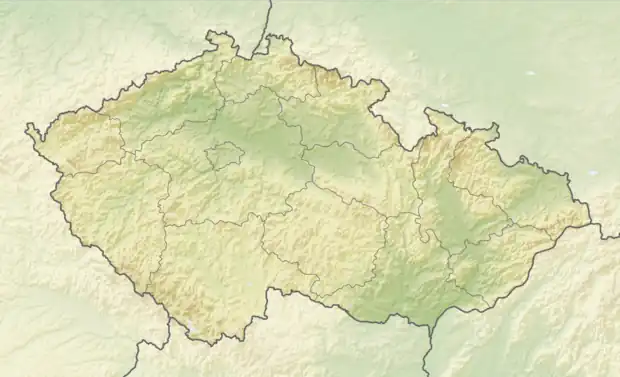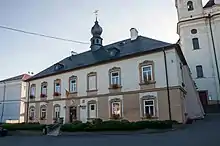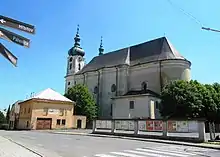Budišov nad Budišovkou | |
|---|---|
.jpg.webp) View from the south | |
 Flag  Coat of arms | |
 Budišov nad Budišovkou Location in the Czech Republic | |
| Coordinates: 49°47′42″N 17°37′47″E / 49.79500°N 17.62972°E | |
| Country | |
| Region | Moravian-Silesian |
| District | Opava |
| First mentioned | 1301 |
| Government | |
| • Mayor | Patrik Schramm |
| Area | |
| • Total | 79.15 km2 (30.56 sq mi) |
| Elevation | 526 m (1,726 ft) |
| Population (2023-01-01)[1] | |
| • Total | 2,826 |
| • Density | 36/km2 (92/sq mi) |
| Time zone | UTC+1 (CET) |
| • Summer (DST) | UTC+2 (CEST) |
| Postal code | 747 87 |
| Website | www |
Budišov nad Budišovkou (Czech pronunciation: [ˈbuɟɪʃov ˈnad buɟɪʃofkou]; German: Bautsch) is a town in Opava District in the Moravian-Silesian Region of the Czech Republic. It has about 2,800 inhabitants. The historic town centre is well preserved and is protected by law as an urban monument zone.
Administrative parts

Villages of Guntramovice, Podlesí and Staré Oldřůvky are administrative parts of Budišov nad Budišovkou.
Etymology
The name Budišov is derived either from the name of the abbot of the Hradisko Monastery named Budiš or from the word búda ("miner's house").[2]
Geography
Budišov nad Budišovkou is located about 24 kilometres (15 mi) southwest from Opava. It lies in the Nízký Jeseník range. The highest point is the mountain Červená hora at 749 m (2,457 ft) above sea level. The town is situated on the Budišovka Stream. Kružberk Reservoir on the Moravice River lies on the northern border of the municipal territory.
Climate
On the mountain of Červená hora is a weather station called Červená. It was established in 1952 and is one of the most remote weather stations in the country. Originally it was created for the needs of the Libavá military training area.[3]
On Červená hora, the annual average temperature is 6.6 °C (43.9 °F). The annual precipitation is 752.5 millimetres (29.63 in). The extreme temperature throughout the year ranged from −25.9 °C (−14.6 °F) on 23 January 2006 to 32.6 °C (90.7 °F) on 30 July 1994.
| Climate data for Červená hora, 1991−2020 normals | |||||||||||||
|---|---|---|---|---|---|---|---|---|---|---|---|---|---|
| Month | Jan | Feb | Mar | Apr | May | Jun | Jul | Aug | Sep | Oct | Nov | Dec | Year |
| Record high °C (°F) | 10.4 (50.7) |
11.8 (53.2) |
16.5 (61.7) |
24.3 (75.7) |
27.7 (81.9) |
31.6 (88.9) |
32.6 (90.7) |
32.5 (90.5) |
28.1 (82.6) |
21.9 (71.4) |
17.4 (63.3) |
11.0 (51.8) |
32.6 (90.7) |
| Mean daily maximum °C (°F) | −1.4 (29.5) |
0.3 (32.5) |
4.7 (40.5) |
11.6 (52.9) |
16.0 (60.8) |
19.6 (67.3) |
21.9 (71.4) |
21.8 (71.2) |
16.0 (60.8) |
10.0 (50.0) |
4.3 (39.7) |
−0.7 (30.7) |
10.3 (50.5) |
| Daily mean °C (°F) | −3.6 (25.5) |
−2.4 (27.7) |
1.1 (34.0) |
6.8 (44.2) |
11.3 (52.3) |
14.7 (58.5) |
16.7 (62.1) |
16.6 (61.9) |
11.7 (53.1) |
6.6 (43.9) |
1.9 (35.4) |
−2.6 (27.3) |
6.6 (43.9) |
| Mean daily minimum °C (°F) | −5.6 (21.9) |
−4.7 (23.5) |
−1.7 (28.9) |
3.2 (37.8) |
7.5 (45.5) |
10.9 (51.6) |
12.9 (55.2) |
12.9 (55.2) |
8.8 (47.8) |
4.3 (39.7) |
0.0 (32.0) |
−4.5 (23.9) |
3.7 (38.7) |
| Record low °C (°F) | −25.9 (−14.6) |
−21.5 (−6.7) |
−16.1 (3.0) |
−8.8 (16.2) |
−3.2 (26.2) |
2.0 (35.6) |
2.4 (36.3) |
0.4 (32.7) |
−0.6 (30.9) |
−9.0 (15.8) |
−13.4 (7.9) |
−19.8 (−3.6) |
−25.9 (−14.6) |
| Average precipitation mm (inches) | 42.7 (1.68) |
39.3 (1.55) |
50.7 (2.00) |
44.5 (1.75) |
84.1 (3.31) |
85.3 (3.36) |
97.1 (3.82) |
80.7 (3.18) |
73.9 (2.91) |
57.6 (2.27) |
50.2 (1.98) |
46.3 (1.82) |
752.5 (29.63) |
| Average precipitation days (≥ 1.0 mm) | 9.8 | 9.3 | 10.5 | 8.0 | 10.9 | 10.4 | 10.8 | 9.4 | 9.2 | 8.7 | 9.3 | 9.5 | 115.7 |
| Mean monthly sunshine hours | 50.0 | 71.7 | 122.1 | 186.4 | 215.2 | 219.1 | 235.9 | 234.0 | 161.0 | 105.7 | 50.8 | 38.5 | 1,690.6 |
| Source 1: CHMI[4] | |||||||||||||
| Source 2: NOAA[5] | |||||||||||||
History

The first written mention of Budišov nad Budišovkou is from 1301, a forest on the site of the settlement was mentioned in 1239. The settlement was originally founded as a mining community next to silver and lead mines in 13th century and soon became a town. Budišov was owned by the bishops of Olomouc and during their rule in the 16th century, the greatest prosperity of the town has taken place. Trade and crafts were developed.[2][6]
The prosperity ended with the Thirty Years' War, during which the town was almost destroyed and repeatedly looted. It was then severely damaged during the Seven Years' War by marching troops. Budišov became impoverished and began to suffer from its remoteness and distance from all the main roads. The town had to be financially assisted by the government around 1870. In 1876, a tobacco factory was opened here, which employed 1,000 people at the beginning of the 20th century. In 1891 the railway was opened.[2]
In 1938, after the Munich Agreement, it was annexed by Nazi Germany and administered as part of the Reichsgau Sudetenland, one of the 6 towns of County Bärn. The German-speaking population, which formed to majority of the town's population, was expelled in 1945 according to the Beneš decrees The town was resettled by Czech families.[2]
Demographics
|
|
| ||||||||||||||||||||||||||||||||||||||||||||||||||||||
| Source: Censuses[7][8] | ||||||||||||||||||||||||||||||||||||||||||||||||||||||||
Economy
Budišov nad Budišovkou is known for slate mining. It has been mined here since the 18th century. There are several former mines and one active mine, reopened in 2015. It is the only open underground mine in the Czech Republic.[6][9]
Transport
Budišov nad Budišovkou is the terminus of a railway line of local importance heading from Suchdol nad Odrou.[10]
Sights

The Church of the Assumption of the Virgin Mary was built in the late Baroque style in 1745–1755. The interior includes a late Gothic statue of the Madonna and Child from around 1500.[2][6]
Notable is a Baroque stone bridge with a statue of Saint John of Nepomuk. Next to the bridge is a water mill, which houses the Slate Museum.[6]
Notable people
- Franz Ignatz Cassian Hallaschka (1780–1847), physicist, rector of Charles University in Prague
- Ernst Kuntscher (1899–1971), German politician
- Oskar Schnirch (1902–1995), Austrian cinematographer
Twin towns – sister cities
Budišov nad Budišovkou is twinned with:[11]
 Głubczyce County, Poland
Głubczyce County, Poland Mszana, Poland
Mszana, Poland Stráňavy, Slovakia
Stráňavy, Slovakia
References
- ↑ "Population of Municipalities – 1 January 2023". Czech Statistical Office. 2023-05-23.
- 1 2 3 4 5 "Historie" (in Czech). Město Budišov nad Budišovkou. Retrieved 2022-03-04.
- ↑ "Meteorologická stanice Červená – jedna z nejodlehlejších stanic u nás" (in Czech). CzechTourism. Retrieved 2023-10-26.
- ↑ "Denní data dle zákona 123/1998 Sb". Czech Hydrometeorological Institute. Archived from the original on 2023-08-28. Retrieved 2023-08-28.
- ↑ "Cervena Climate Normals 1991-2020". National Oceanic and Atmospheric Administration. Archived from the original on 2023-09-21. Retrieved 2023-09-21.
- 1 2 3 4 "Budišov nad Budišovkou" (in Czech). CzechTourism. Retrieved 2022-03-04.
- ↑ "Historický lexikon obcí České republiky 1869–2011 – Okres Opava" (in Czech). Czech Statistical Office. 2015-12-21. pp. 1–2.
- ↑ "Population Census 2021: Population by sex". Public Database. Czech Statistical Office. 2021-03-27.
- ↑ Dušek, Petr (2015-05-10). "Břidlicový Důl Radim byl otevřen". Opavský a Hlučínský Deník (in Czech). Deník.cz. Retrieved 2022-03-04.
- ↑ "Detail stanice Budišov n.Budišovkou" (in Czech). České dráhy. Retrieved 2023-10-26.
- ↑ "Partnerská města" (in Czech). Město Budišov nad Budišovkou. Retrieved 2022-03-04.